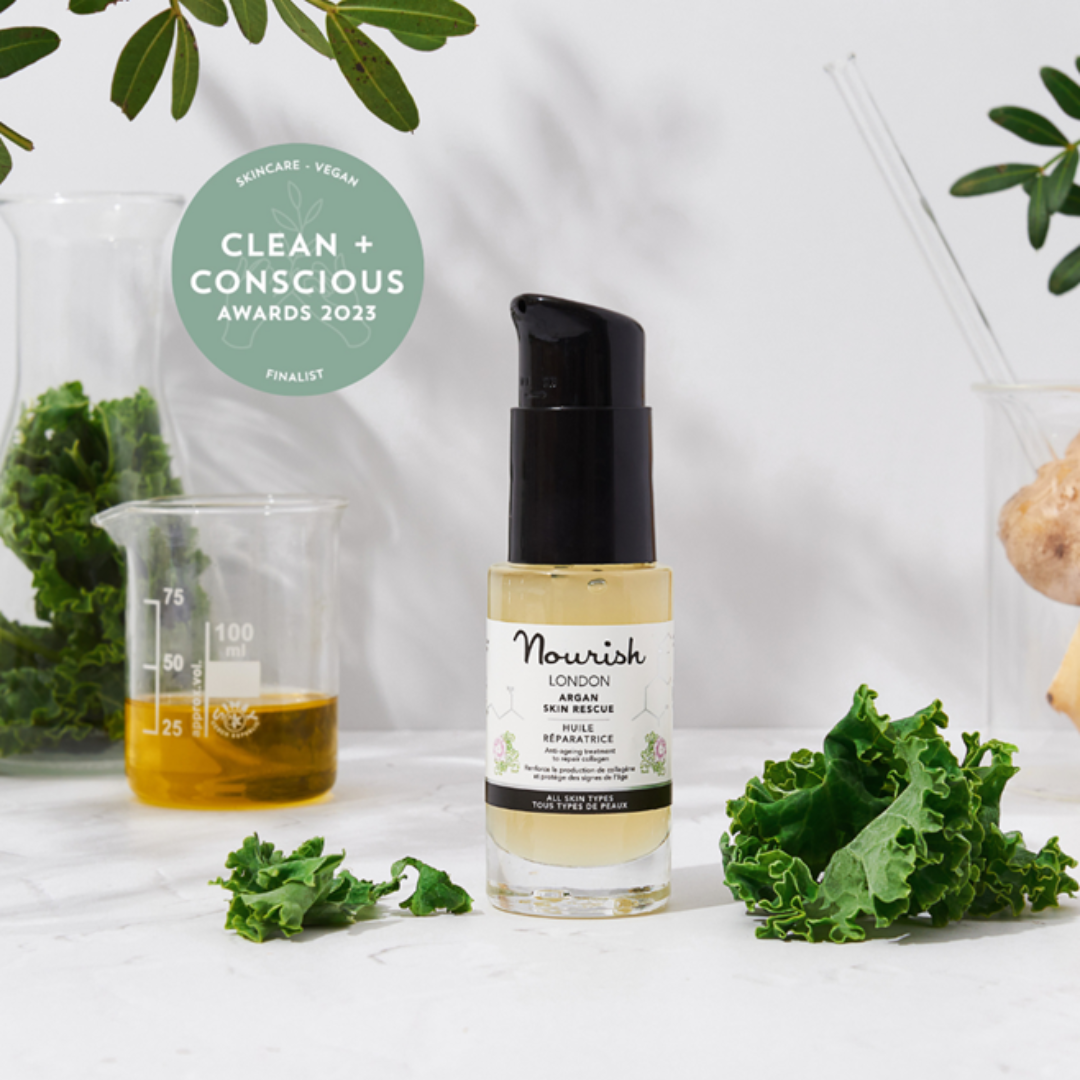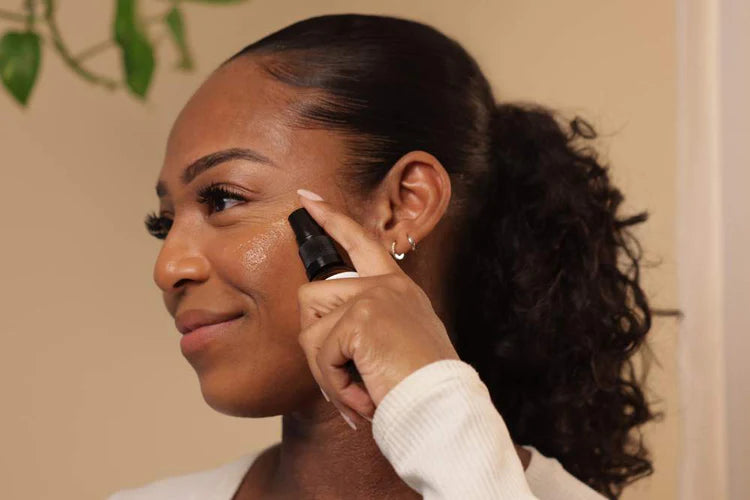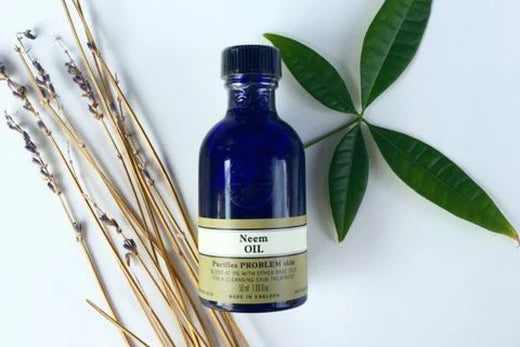We sat down with Nourish London founder, chemist & biochemist Pauline Hili to talk about the effects of menopause on our skin and her suggestions to navigate this with as much support as possible. Pauline has a long background in formulating exceptional natural skincare.
We hope you enjoy the read!
Menopause, what comes to mind when you hear that term?
Hormones changing?
No more periods?
Hot flushes?
While these are all commonly known the changes women experience, our skin also goes through major changes during menopause. Our skin is the body's largest organ and one of its main functions is protection. However, there are many other factors that can cause our skin to change on a daily basis - seasons, climate, our mood, lifestyle etc. Add hormonal changes to the menopause mix and this will significantly affect the appearance of our skin.
Here, we discuss five ways your skin may evolve as you age (and what you can do to support your skin’s natural defences).
1. Skin Itching
Itching skin during menopause is one of the lesser-known side-effects caused by a drop in oestrogen. As your oestrogen levels drop, so does your collagen and the natural oils that keep your skin moisturised. Of course, scratching your dry and itchy skin can cause further damage, so treating the problem areas is important.
Make sure you drink plenty of water during the day to limit hydration. Vitamin E supports rebuilding the skin’s collagen and argan soothes irritation. Omega oils, like those in the
Nourish London Argan Skin Rescue, are known to help the skin stay soft and supple.
We recommend using the
Nourish London Probiotic Multi-Mineral Repair Mask, a n
utrient-rich treatment cream face mask powered with probiotic minerals essential for healthy skin repair. This innovative treatment, infused with Damask Rose and Lavender will boost collagen, diminish wrinkles, and restore healthy, supple firmness to the skin. Magnesium and lavender also help to soothe and calm the skin.
2. Rashes
Rashes can coincide with menopause but are not a result of dry, itchy skin. When your hormones change, it can leave you more vulnerable to redness and irritation. As with itchy skin, supporting the natural production of collagen can help reduce the occurrence of rashes. Argan is an excellent source of vitamin E to support rebuilding collagen and replenish the skin.
3. Wrinkles and sagging
Skin will naturally wrinkle as we age. As our estrogen level reduces, we are less able to store fat under our skin which means it loses its natural elasticity. This causes the skin to wrinkle and sag. Although our whole body will lose firmness over time, our face is exposed to pollutants and changes in the air, so is more prone to wrinkles.
Keeping hydrated by drinking plenty of water will help, and you will also want to help keep the skin firm. Vitamin A is crucial for firmer skin. This is why we include kale, pumpkin seed oil and rosehip seed oil in many of our products. To help lift and firm the delicate neck and decollete area, daily use of the
Nourish London T.S.L Tighten, Sculpt and Lift Neck Elixir, is proven to improve the look and texture of the neck area within 28 days. Created with a blend of antioxidants and peptides, it is a natural way to minimise the signs of ageing.
4. Pigmentation
As you age, your skin may also change colour. You may find that the pigmentation of your skin changes during menopause on your cheeks, upper lips and forehead. In addition to hormonal changes, sun exposure can also affect pigmentation. When choosing your skincare, look for moisturisers that include ceramides, as these help to repair the skin. Hyaluronic acid is a natural ceramide that helps the skin heal and you can find this in the
Nourish London Argan Anti-Ageing Peptide Serum.
You could also supplement this with the
Nourish London Antioxidant Peptide Mist which contains liquorice to help reduce pigmentation. You can refresh and cool your skin throughout the day, particularly if you suffer from hot flushes.
5. Breakouts
If only acne and spots would end in our teenage years! Yet, as you go through perimenopause, you may find that breakouts begin again. Your balance of hormones changes as you approach menopause. Life’s stresses, diet and immune system can also upset your cortisol and insulin balance. All of this results in breakouts on your skin as you produce more sebum as a result.
To tackle these changes, protect your skin against the outside environment and rebalance with natural skincare that contains Niacinamide (vitamin B). This helps balance sebum which causes oily and combination skin. Plus look out for products containing argan and saw palmetto which can help regulate the sebum on your skin.
Protecting your changing skin during menopause
However your skin changes during menopause, it is important that you hydrate and support your skin’s natural development of collagen. You can focus on problem areas such as controlling sebum levels if you have acne breakouts or repairing skin damage with vitamin A and Hyaluronic acid. This will help you target the many changes that naturally happen to your skin as your age.
Support your skincare with a healthy diet and exercise. Practicing mindfulness and taking time out to rest can also help alleviate some of the other symptoms associated with the menopause such as stress, which is known to manifest itself on our skin. This is because cortisol, one of the stress hormones, is in part managed by oestrogen, so when our oestrogen is dropping it makes us less able to regulate cortisol and we feel more stressed. Rest can take many forms, including mental, sensory, social rest as well as physical. Find something that you find restful: be it colouring, looking at nature, kickboxing, hanging out with a kind friend, meditating or napping… the possibilities are endless.


